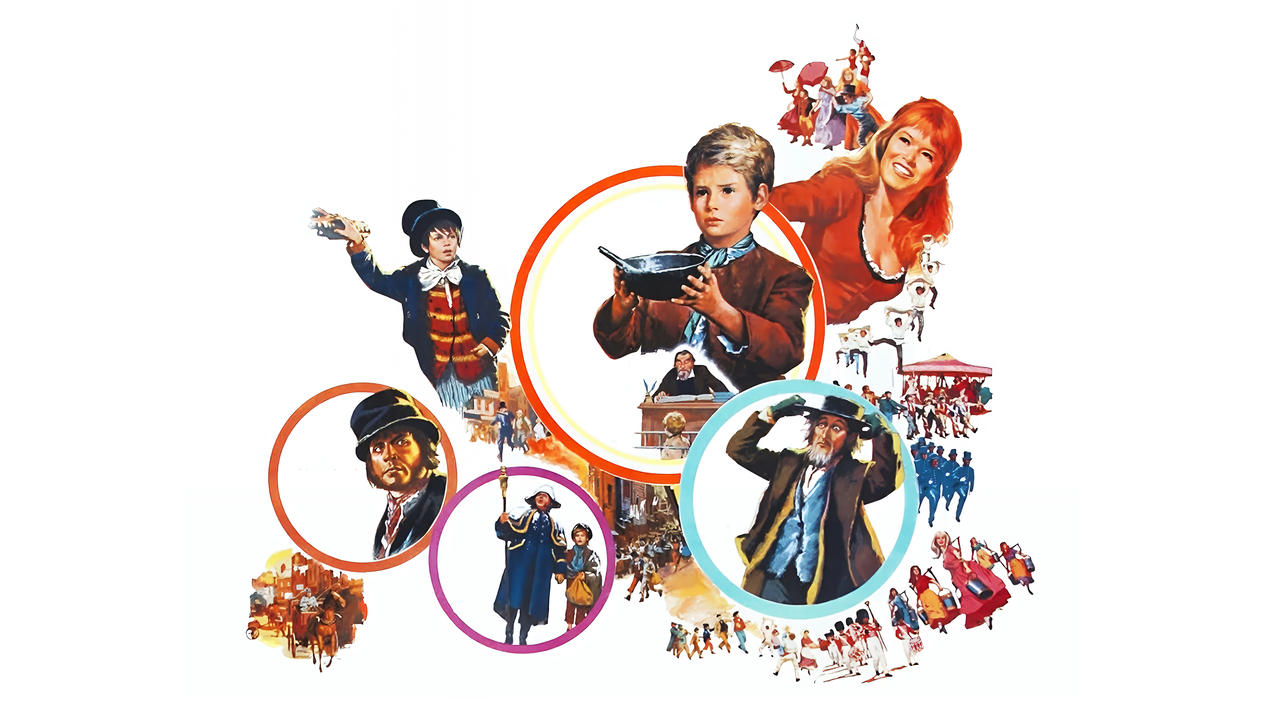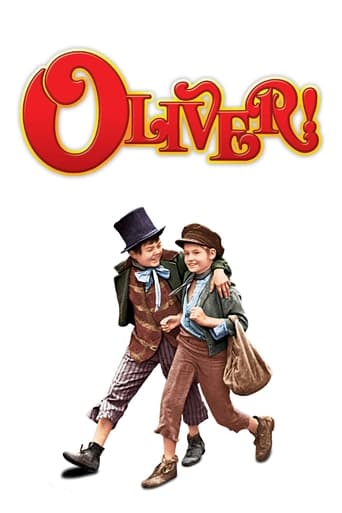Inadvands
Boring, over-political, tech fuzed mess
Ogosmith
Each character in this movie — down to the smallest one — is an individual rather than a type, prone to spontaneous changes of mood and sometimes amusing outbursts of pettiness or ill humor.
Stephanie
There is, somehow, an interesting story here, as well as some good acting. There are also some good scenes
Cassandra
Story: It's very simple but honestly that is fine.
merelyaninnuendo
Oliver!3 Out Of 5Oliver is a character driven musical about a boy who is adapting and learning as he outgrows difficulties that comes before him in various faces. The camera work is amazing as it lights up the whole screen and fills it up with an energy that can easily feed itself for runtime which may be overstretched but is undeniably glorifying to encounter. It is rich on technical aspects like costume design, production design, choreography, art design, background score and songs whilst is a bit short on editing; it easily could have been of 2 hours. There isn't much work allotted to the writing section as most of the communication is conveyed through musical acts, which are again, beautifully shot and is immensely pleasing on screen. The screenplay by Vernon Harris is neither gripping nor smart, but it certainly has a heart and reasoning in there for the audience to root for its sketchy characters. Carol Reed; the director, has done a decent work on pulling off this act on such a larger scale. The performance by the younger cast is amazing especially all the musical acts that they have pulled off and so are the experienced cast supporting them. Oliver! is neat and essential for the subsequent generations but it may not be as entertaining or wise as it seems.
James Hitchcock
For a long time it was assumed that there were certain film genres which we Brits just didn't do. These included Westerns (obviously) and also cartoons; "Animal Farm" from 1954 was the first British animated feature, and for a long time thereafter about the only one anyone could name. And musicals. Although plenty of musicals were written for the West End stage, few of these ever found their way onto the screen. There were musicals set in Britain, like "My Fair Lady" and "Mary Poppins", but both were made in America by American studios. And then, suddenly, along came "Oliver!"- an all-singing, all-dancing screen musical in the best Broadway/Hollywood tradition, made in Britain by a British studio with a British director and all-British cast. Far from resenting this invasion of what had traditionally been their territory, our American friends loved it so much that they gave it a "Best Picture" Oscar for 1968.I won't set out the plot because it is so well known. It is essentially that of "Oliver Twist" with a few alterations. The Monks subplot is omitted altogether. (No great loss). Oliver's home town, never named in the book, is established as Dunstable. (Dickens describes it as being about a hundred miles north of London, considerably further north than Dunstable. Was this change made to hide the fact that Mark Lester does not speak with the Midlands accent which Dickens' character would have had?)The biggest change is in the character of Fagin, portrayed here as a loveable old rogue rather than Dickens' cynical corrupter of youth. This change was probably motivated by concerns over Dickens' perceived anti-Semitism; both Lionel Bart, who wrote the stage musical on which the film was based and Ron Moody, who created the character of Fagin, were Jewish. When I first saw the film I did not like this change, but having seen the film again recently I am prepared to change my mind. Making Fagin into a kindly, if less-than-honest, father-figure may in fact have strengthened Dickens' theme of poverty as a cause of crime rather than weakening it. His boys invite the new arrival Oliver to "consider yourself one of the family", and whatever else Fagin may have done he has at least provided them with the only family they are ever likely to know. For them the only alternatives to life as part of this family are either beggary or a workhouse like the one from which Oliver has just escaped. Picking pockets is a minor crime compared to the ones of which the Victorian Establishment were guilty, like imprisoning paupers and orphans in workhouses. "Oliver!" was nominated for eleven Oscars and won six, a remarkable feat for any film but even more so for a British film which stars few, if any, actors who would have been internationally known in 1968. Moreover, few would have been household names even in Britain, apart from Oliver Reed (nephew of the director Carol Reed) as the thuggish criminal Bill Sikes and the well-loved, genial comedian Harry Secombe, cast against type as Mr Bumble, the pompous and heartless overseer of the workhouse. I have never thought that Lester, who comes across as too well-scrubbed and middle-class to be credible as a workhouse boy, was the ideal choice to play Oliver, but with that caveat the acting is generally of a very high standard, with fine contributions from Reed, Moody, Secombe and the young Jack Wild as the Artful Dodger. Special mention should go to Shani Wallis (an actress I have never seen in any other film) in the difficult role of Nancy. Nancy is a prostitute (although this aspect is played down in the film to keep the family audience), the associate of a gang of thieves and the mistress of a violent criminal. Yet she is also the film's heroine, someone with whom the audience must sympathise as she struggles to reconcile her innate decency with the realisation that the man with whom she has fallen in love is not just bad but irredeemably bad. Her dilemma is expressed in the film's most heart-rending song "As Long as He Needs Me", although Nancy also gives expression to the lighter, fun-loving side of her nature in "It's a Fine Life" and "Oom-Pah-Pah".The musical numbers are nearly all tuneful and memorable, with some fine lyrics. Besides those already mentioned the ones that stood out for me were "Food, Glorious Food", in which the workhouse boys sing of their hopes of a better (or at least better-fed) life, "You've Got to Pick a Pocket or Two" and "Reviewing the Situation", in both of which Fagin sets out his cynical philosophy of life, and screenplay directed by and "Consider Yourself" and "Who Will Buy?", both exuberant song-and-dance numbers set against a vividly recreated Victorian London. Yes, "Oliver!" can be sentimental at times, but that is something often associated with the musical genre, and also often with the novels of Dickens, a man never afraid to wring his readers' hearts. Watching the film again recently I was surprised by just how well it still stands up today, fifty years after it was made, as a rare example of the Great British Musical. 8/10A goof. One of Nancy's friends wears a bright purple dress. Later in the 19th century purple was to become a popular colour for all social classes, before the invention of synthetic dyes in the 1850s) there is no way a working-class girl could have afforded such a thing. At the time the film is set (the late 1830s), purple dye was notoriously expensive and reserved for the wealthy; there is a reason why royalty are said to be "born to the purple".
febru3012
Going to today's movies feels like attending a barbaric assault on ones senses. There's the foul rotten language, the pervasive sex (heter, bi, trans and homo), the messages that 1) all humans are evil 2) the human condition is one of desperation and 3) the means justify the end. Oliver! transcends all of this with superb acting, script, direction and production. Oliver! is a masterpiece that will never die because its the epitome of quality. I went on line after seeing Oliver! and bought the Blu Ray disc off Amazon. It will now take a prominent position in my DVD collection. Thank you actors, directors, writers and producers for bringing the viewing public a reminder of how good movies can truly be, even when its this rare.
mark.waltz
O.K., you could make it darker. You could "Sweeney Todd" it up and have Bill Sikes be exactly like that throat slicer who had the victims then turned into meat pies. But what they did with the film version of the 1960 London musical (brought to Broadway in 1963) is keep it faithful to that source, if not the original Charles Dickens novel with all the controversy of so-called anti-Semitism.Sweet little orphan Oliver (Mark Lester) wins the dare to ask for "more!" and when he does, he is throunced, bounced, and sold to a flustered undertaker named Sowerberry. Too sauced to save his purchase, Sowerberry sleeps it off in a coffin while Oliver beats up the older assistant Noah. Oliver escapes to London, meets up with the Artful Dodger (Jack Wild), and is soon off to see the Wizard of Pickpocketing, the hawk-nosed Fagin (Ron Moody), a lovable old codger of thievery with a few tricks up his sleeve. Fagin's co-horts, Bill and Nancy Sikes (Oliver Reed and Shani Wallis) both have different ideas of what to do with Oliver, but first they must get him back from the rich man who saved Oliver from being accused of picking his pocket.Musically, this is exciting, from the pleading "Food, Glorious, Food!" to the touching "Where is Love?" in the beginning, exploding into big city joy in the London-set "Consider Yourself", and then music hall glory with Wallis's loving Nancy singing such showstoppers as "It's a Fine Life!" and "Oom-Pah-Pah!".Title character Oliver is visually perfectly cast with the diminutive Mark Lester who has the right innocence for him with a touch of toughness when he needs to bring that out. Lester, seemingly dubbed with a high-pitched singing voice, does what he can to make the character not pitiable, but oh, that singing voice. Harry Secombe is an unforgettable Mr. Bumble, Moody a joy as that rascal Fagin who teaches his boys "You've Got to Pick a Pocket or Two!". Wild and Wallis shine with "I'd Do Anything", and the ensemble of "Who Will Buy?" is a huge production number that keeps the joy coming.All in all, there is nothing to complain about in this production, the right songs cut from the original and even the smallest parts perfectly cast with perfect visuals from the book. Once you see this (again and again) you will also see the similarities to another big stage musical, the Manhattan set "Annie", which also deals with an orphan trying to find her legacy and dealing with crooks in the meantime. Both shows have dogs, but Bill Sikes' pooch in "Oliver!" is a lot more nefarious looking than Sandy from "Annie".

